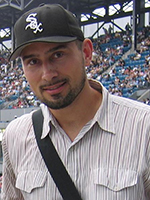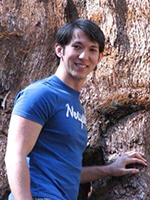A guest blog by Paul Graham

It is not an easy thing to do…admitting that you were wrong. Let alone be glad about it. But that was exactly the case six years age this August, when I decided to eliminate the use of animal products in my life and to live a fully compassionate and conscious lifestyle. The practical side of doing it was not the hard part…I found it rather easy to do when my mind, body and spirit all got on the same page of understanding. The harder part was coming to grips with the fact that for fifty years of my life I had been living with only a partial understanding of the realities that were happening in and around me. I was “dead” wrong in the way I was perceiving my relationship to animals in my life and the way that I was supposed to co-exist with them. It was one of the most profound revelations that I could imagine.
As I was watching “The Long Ranger” yesterday, I was struck with a thought…besides the fact that I really like my bud Johnny Depp. The movie starts out with a young boy dressed as The Lone Ranger walking into a carnival exhibit of The Old West. He sees the buffalo, a bear and then comes upon a rather old Indian. He is startled when the Indian is actually alive and begins to talk to him. “Tonto” begins to tell the boy of his adventures with The Lone Ranger. It was a very creative way to tell the story and it got me to thinking. How powerful it would be if we could have a living exhibit with some of the great orators, scientists, artists, writers, statesmen and humanitarians throughout history who have written and spoken for us words of enlightenment to encourage us to abstain from the eating and use of animals in any way in our lives? This would be something I would love to hear. It would be so impactful knowing that these great minds have have been speaking for centuries upon centuries about what I came to understand just a handful of years ago. The sad part would be that too few people actually listened to their wisdom over the years, and billions and trillions of animals have suffered as a result.
A sampling of an exhibit like this would sound something like this with a great orator such as Pythagorus, one of the fathers of science, saying, “The Earth affords a lavish supply of richness of innocent foods and offers you banquets that involve no bloodshed or slaughter, only beasts satisfy their hunger with flesh, and not even all of those, because horses, cattle and sheep live upon the grass.” He also would say, “Animals share with us the privilege of having a soul.” Nikola Tesla was a great humanitarian and scientist. You could hear him say, “Animal slaughter was wanton and cruel.” The great Leonardo DaVinci would be fascinating to listen to and we could hear him say, “I have from an early age abjured the use of meat, and the time will come when men such as I will look upon the murder of animals as they now look upon the murder of men.” He would probably go on to say about how the ingesting of animals makes our bodies to be “graveyards.”
There would certainly be some great writers present who would have much to say. Henry David Thoreau could be heard sharing these words, “I have no doubt that that it is part of the destiny of the human race, in its gradual improvement, to leave off eating animals, as surely as the savage tribes have led off eating each other when they come in contact with the more civilized.” Leo Tolstoy wrote much about non-violence and also was an advocate of vegetarianism which led to his friendship with Gandhi. Tolstoy would no doubt have much to say, such as “Flesh eating is simply immoral, as it involves the performance of an act, which is contrary to moral feeling: killing.” He would also say, “If a man aspires towards a righteous life, his first act of abstinence is from injury to animals.” George Bernard Shaw would certainly be one of the characters of the exhibit and would talk endlessly. “I was a cannibal for twenty-five years. For the rest I have been a vegetarian.” He would pull no punches: “We pray on Sundays that we might have light to guide our footsteps on the path we tread; we are are sick of war we don’t want to fight. And yet we gorge ourselves upon the dead.” ” A man of my spiritual intensity does not eat corpses.” “All great truths begin as blasphemies.”
Great statesmen would be seen and heard and remembered for their courage to speak the truth no matter what the contrarian thought might be. Thomas Paine would proclaim, “Everything of persecution and revenge between man and man, and everything of cruelty to animals, is a violation of moral duty.” Benjamin Franklin would be fascinating and we could hear the wisdom of “Flesh eating is unprovoked murder.” On the subject of vegetarianism, he would note that “one will achieve greater progress from the greater clearness of head and quicker comprehension.” President Abraham Lincoln could be heard in his distinctive voice to say, “I am in favor of animal rights as well as human rights. It is the way of a whole human being. He would also remark that, “I care not for a man’s religion whose dog and cat are not better for it. Gandhi would keep us spellbound with his gentle spirit and powerful words: “To my mind the life of a lamb is no less precious than that of a human being. I hold that, the more helpless the creature, the more entitled it is to protection by man from the cruelty of man.”
We would be overcome with the truth touching our heads, hearts and our very souls. Henry Salt would state, “The emancipation of men from cruelty and injustice will bring with it in due cause the emancipation of animals also. The two reforms are inseparately connected and neither can be fully realized alone.” Thomas Edison would challenge us with, “Non-violence leads to the highest ethics, which is the goal of all evolution. Until we stop harming all other living beings, we are still savages.” Albert Schweitzer would bring us this thought: “The time is coming when people will be amazed that the human race existed so long before it recognized that thoughtless injury to life is incompatible with real ethos. Ethics in its unqualified form extended responsibility to everything that has life.” Albert Einstein, with his wild hair and scribblings on the chalkboard would leave us with hope that “nothing will benefit human health and increase the the chances for survival of life on Earth as much as the evolution to a vegetarian diet.” I hope that this idea for an exhibit like this resonates with someone and they run with it. I think it could impact a lot of people.
I can do very little now about the first half of my life other than admit that I was wrong about a lot of things. It was not until I opened my mind and my heart to this truth that I could actually move not only forward, but higher in my own life. It has opened up incredible vistas to me and has connected me with remarkable people that I will work hand in hand with for the second half of my life towards fulfilling the goals and ideals that these thoughtful and compassionate people through history have spoken and written. It is hard to admit that you were wrong, or perhaps that you were taught a wrong way to live. I understand that…I lived it. But I also know there is life on the other side of this decision that provides not only life for you, but also every other living creature. We can take off an old grid that we lived life through and put on a new one. It is the life that I dream of where ever man, woman and living being can be free. We can live and co-exist together, the way it has always been meant to be. I want to live to see that day.
 Paul Graham was born and raised in Northern California and has lived in Las Vegas since 2004. He is a top wedding officiate, a green Realtor and writer. He has a daily vegan food blog www.eatingveganinvegas.tumblr.com which is 365 days and 365 vegan meals in Las Vegas. He can also be reached at eatingveganlv@gmail.com or www.facebook.com/EatingVeganinVegas. Paul’s e-book, “Eating Vegan in Vegas: If It Can Happen Here, It Can Happen Anywhere” is now available at www.sullivanstpress.com.
Paul Graham was born and raised in Northern California and has lived in Las Vegas since 2004. He is a top wedding officiate, a green Realtor and writer. He has a daily vegan food blog www.eatingveganinvegas.tumblr.com which is 365 days and 365 vegan meals in Las Vegas. He can also be reached at eatingveganlv@gmail.com or www.facebook.com/EatingVeganinVegas. Paul’s e-book, “Eating Vegan in Vegas: If It Can Happen Here, It Can Happen Anywhere” is now available at www.sullivanstpress.com.





